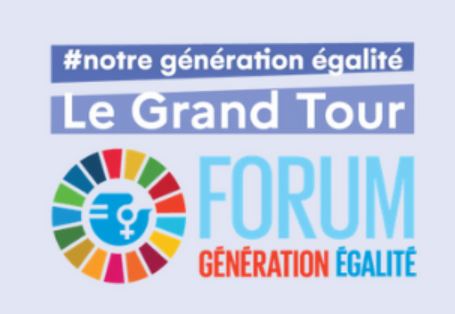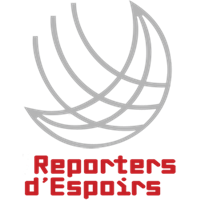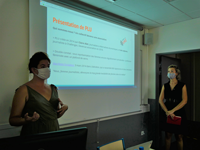2020-2021
-
April 24, 2021, Consultative Conference in partnership with Open Diplomacy: the Grand Tour #OurGenerationEquality
 The Generation Equality grand tour forum
The Generation Equality grand tour forumIn June 2021, France presided over the UN Women's Summit in Paris: the Generation Equality Forum. To prepare for this major event of feminist diplomacy with French women and men, the Open Diplomacy Institute organized the Grand Tour #OurGenerationEquality from April 8 to May 17.
EJCAM and AMU hosted the online advisory conference,on the campus of Aix-en-Provence, on April 24 at 14:00. The speakers were :
Ms. Sophie Cluzel, Minister in charge of the Disabled
Thomas Friang, Founder and Managing Director of the Open Diplomacy Institute
Yaël BRAUN-PIVET, Member of Parliament for Yvelines and President of the Commission for Constitutional Laws, Legislation and General Administration of the Republic
Marie-Paule Grossetete, Co-president of CLEF
Bernard Gainnier, President of PwC FranceProf. Isabelle Régner, Vice-president for Equality between Women and Men and the Fight against Discrimination at AMU
Elisabeth Luc, Founder of "Potentielles"Isabelle Templer, Director of the RHESO Association
Ariane Thomas, Global Tech Director of Sustainability at L'Oréal GroupSEM Delphine O, Ambassador and Secretary General of the "Forum Génération Égalité"
HEM Mohamed Karim Jamoussi, Ambassador of TunisiaAix-Marseille University (AMU) follows CNIL guidelines
The platform that broadcasts this content conditions its reading to the deposit of tracers in order to offer you targeted advertising according to your navigation.
By clicking on 'I authorize', the cookies will be deposited and you will be able to view this content.
I authorizeThe video replay of the conferenceAix-Marseille University (AMU) follows CNIL guidelines
The platform that broadcasts this content conditions its reading to the deposit of tracers in order to offer you targeted advertising according to your navigation.
By clicking on 'I authorize', the cookies will be deposited and you will be able to view this content.
I authorize3 questions to Mrs. Sophie Cluzel -
April 01, 2021, Territorial Knowledge Conference "Industrial reconquest, a challenge for our territories?"
 nouvo-logo-connaissance-du-territoire-carre_2.png
nouvo-logo-connaissance-du-territoire-carre_2.pngThe online meeting took place on April 01 from 11:00 to 13:00.
Nine out of ten French people want the state to encourage the relocation of industrial companies on national soil, even if this means higher prices, according to an Odoxa-Confluence survey in 2020. This broad call for factories to return is a form of response to the health crisis, but this concern is not new. In 2018, France launched its "territories of industry" plan.
How is industry positioned in the Provence-Alpes Côte d'Azur region? What are the contours of a relocated industry of the future? What conditions are favorable to the emergence of industrial ecosystems? How can we reconcile industrial development and environmental issues?
Based on this inventory of regional industry, how can we sketch out a more desirable economy for our region?
- Pascale Rouaud, INSEE project manager, presented an overview of industry in the region
- Pierre Veltz, economist and sociologist, winner of the 2017 Grand Prix for urban planning, was our main witness.
The meetings are moderated by Alexandre Joux, Director of EJCAM
Listen to the podcasts made by EJCAM students
-
March 29, 2021, The "Tour des Reporters d'Espoirs" stops in Marseille on Monday, March 29, and meets the students of EJCAM
 Reporters d'espoirs
Reporters d'espoirsJournalist Raphaelle Duchemin (France Bleu, France Info, RMC, Europe 1 where she hosted the daily program "La France Bouge") and Gilles Vanderpooten (director of the NGO Reporters d'Espoirs, a pioneer of "solutions journalism" since 2004) shared their experience of solutions journalism, the good practices they have observed in France and abroad, and their work on the treatment of climate issues. They testified and exchanged with the students.
The "Tour des Reporters d'Espoirs" is a 10-stop tour in 10 French cities to meet journalists from regional media and future professionals, to discuss the future of media and solutions-based journalism. It stopped in Tours, Nice, Marseille, Amiens, Bordeaux and Lille, between March and June 2021.
Time and place: 12:00-13:00, room 004 A & B, Marseille site
-
December 10, 2020, Round table on territorial knowledge: "The territory in the test of the health crisis".
 nouvo-logo-connaissance-du-territoire-carre_2.png
nouvo-logo-connaissance-du-territoire-carre_2.pngThis round table was broadcast on December 10th at 10:30 am on the Festival du jeu de l'oie website: festivaljeudeloie.fr.
It was followed by a debate in video-conference with the speakers on registration only.While all the territories were at a standstill during the first containment, some will remain more permanently marked by the fragility of their populations and their economic fabric. The health crisis that is still at work has also had multiple consequences on lifestyles and ways of living. The urban model appears to be weakened by this crisis, and some even see it as a challenge to the metropolises and a revenge for medium-sized cities and the countryside.
In this context, "how can we get this world back on track? What economic and social responses should be given to the challenges adapted to the specificities of the territories? And what are the regional planning practices to be reinvented?
The Provence-Alpes-Côte d'Azur Region and INSEE joined forces with Aix-Marseille University to disseminate and debate the knowledge produced on the crisis and its socio-economic impacts on the territories, on the occasion of a meeting "Outside the walls" questioning the necessary adaptation of the territories in the face of the multiple challenges posed by the COVID-19.
This virtual meeting is organized around a round table followed by a debate.
On the program of this meeting:
- Starting at 10:30 am, a round table discussion moderated by Alexandre Joux, Director of EJCAM, brought together two major witnesses: Pierre Veltz (economist, urban planner and geographer) and Laurent Mucchielli (sociologist), around the following presentations:
- Key figures on the socio-economic effects of the health crisis in the region (Alexandre Gautier, Deputy Regional Director, INSEE)
- What regional urban model in the world after? (Laure Casanova for the Scientific Council for Knowledge and Strategic Planning of the South Region)
- The inhabitants and territories of the Provence-Alpes-Côte d'Azur region faced with the crisis (Alexandre Grondeau / MMSH - Observatory of Local Development - AMU)
-
November 12, 2020, Territorial Knowledge Conference "Getting ready for sustainable transport in Provence-Alpes-Côte d'Azur".
 nouvo-logo-connaissance-du-territoire-carre_2.png
nouvo-logo-connaissance-du-territoire-carre_2.pngThe challenges of energy transition and adaptation to climate change that territories must face require a careful look at the organization of urban development and its consequences. Mobility is, along with housing and the economy, the foundation of local development. Although the region is well connected to the rest of the world, it is experiencing difficulties linked to the excessive use of cars for daily travel.
Daily mobility flows are intensifying in Provence-Alpes-Côte d'Azur, and show a lengthening of distances between work and home, while the regional transport offer continues to grow, revealing a still significant dependence on the car in our region.
What are the characteristics of mobility in the region?
Electric vehicles, active mobility, public transport, how is alternative mobility developing in the region?
What impact has the health crisis had on individual practices?
In order to understand the many issues and challenges related to sustainable mobility, we offer you an overview of the knowledge available in terms of regional mobility, and of new innovative and sustainable mobility practices with regard to environmental and societal issues.
- Vincent Tinet, Head of the Mobility Unit at the Marseille Urban Planning Agency, drew up an overview of mobility in the region based on work carried out in the framework of the partnership between the Region and the region's urban planning agencies. See the study Panorama de la mobilité régionale.
- Mariane Thébert, geographer, talked about the impact of mobility on the functioning and development of urban and peri-urban areas, and sustainable transport.
The meetings are moderated by Alexandre Joux, Director of EJCAM.
-
October 01, 2020, Territorial Knowledge Conference: "The territory at the time of the climate change in Provence-Alpes-Côte d'Azur".
 nouvo-logo-connaissance-du-territoire-carre_2.png
nouvo-logo-connaissance-du-territoire-carre_2.pngThe Provence-Alpes-Côte d'Azur region, and more broadly the entire Mediterranean area, are particularly concerned by global warming, the combined effects of which will be all the more marked in the years to come. In this context of climatic emergency, the deterioration of air quality and its health impacts question our ways of thinking, living and planning our territories.
What are the impacts at the regional level? How can we anticipate the effects on the health of inhabitants?
What are the opportunities and vulnerabilities of the regional space to respond to the multiple challenges?
- Yann Channac, study engineer at AtmoSUD, presented the results of the Insee Analyse N°80, Air pollution by PM10 in 2017
- Joël Guiot, geologist, Research Director at the European Center for Research and Education in Environmental Geosciences CEREGE, explained the impacts of climate change on the regional territory.
The discussions were led by Alexandre Joux, Director of the EJCAM.
These interventions were followed by a debate with the public.
The students of EJCAM have produced an original reflection on the subject in various journalistic formats.
Articles written by EJCAM students in Marsactu
Edit the videos made by the students of EJCAM
-
September 18, 2020, Awareness seminar on sexism in the media by the association "Prenons la Une", led by Anaïs Bouitcha and Constance Léon, journalists
 Anaïs Bouitcha and Constance Léon, journalists
Anaïs Bouitcha and Constance Léon, journalistsThe training we offer is based on two pillars: good professional practices for a balanced treatment of information (vocabulary, figures, sources...) and information and resources on sexism and/or violence in the workplace (what the law says, who to contact...). This means that we train students to spot sexist clichés in headlines, portraits, TV, radio and print reports. We give them tips on how to diversify their contact books, so that they are careful to give women experts a chance. We give them figures to present the current media context. We show them that investigating women's rights or domestic crimes is not activism, it's dealing with social facts, justice or injustice, it's doing a good job as a journalist (and it can give them a job when they leave school). So we tell them where to report - in their future professional lives but also from their first internships - sexist jokes, colleagues who languidly massage their shoulders or put hands on their buttocks, what recourse they have against sexual harassment and assault. As future professionals, they will be the members of tomorrow's Front Page. It is essential to give them keys to respond to sexism in certain media. It is essential to establish time for discussion with students, to open up the floor.
